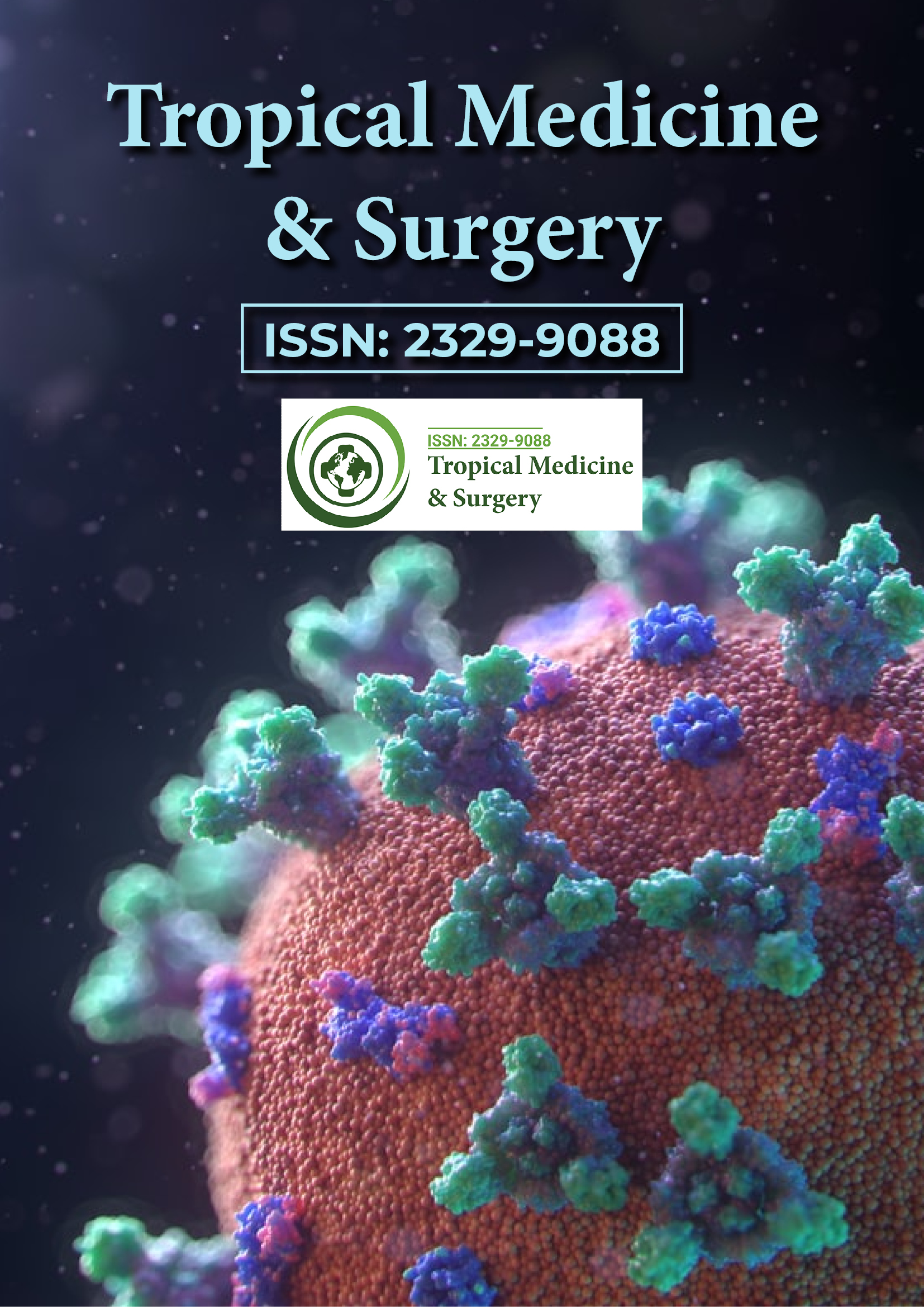PMC/PubMed Indexed Articles
Indexed In
- Open J Gate
- Academic Keys
- RefSeek
- Hamdard University
- EBSCO A-Z
- OCLC- WorldCat
- Publons
- Euro Pub
- Google Scholar
Useful Links
Share This Page
Journal Flyer

Open Access Journals
- Agri and Aquaculture
- Biochemistry
- Bioinformatics & Systems Biology
- Business & Management
- Chemistry
- Clinical Sciences
- Engineering
- Food & Nutrition
- General Science
- Genetics & Molecular Biology
- Immunology & Microbiology
- Medical Sciences
- Neuroscience & Psychology
- Nursing & Health Care
- Pharmaceutical Sciences
Commentary Article - (2024) Volume 12, Issue 2
Depths of Tropical Neglect Diseases and Impact on Global Health Strategies
Bart Dunachie*Received: 02-May-2024, Manuscript No. TPMS-24-25698; Editor assigned: 06-May-2024, Pre QC No. TPMS-24-25698 (PQ); Reviewed: 20-May-2024, QC No. TPMS-24-25698; Revised: 27-May-2024, Manuscript No. TPMS-24-25698 (R); Published: 03-Jun-2024, DOI: 10.35248/2329-9088.24.12.349
Description
Neglected Tropical Diseases (NTDs) represent a group of debilitating illnesses that predominantly afflict the world's poorest populations, exist in primarily in tropical and subtropical regions. These diseases, often overlooked and continue to inflict suffering on millions, perpetuating cycles of deficiency and impeding socio-economic development. The depths of tropical neglect exploring the causes consequences and potential solutions to this global health crisis. Despite their devastating impact, these diseases often languish in obscurity, overlooked by the global health community and neglected in terms of intervention. The intricate webs of factors contributing to tropical neglect and examine potential strategies for addressing this crisis.
Neglected tropical diseases encompass a diverse array of illnesses, ranging from parasitic infections to viral and bacterial diseases. These include malaria, dengue fever, Chagas disease, leishmaniasis, lymphatic filariasis, and many others. What unites these diseases is their prevalence in regions with limited access to healthcare, clean water, and sanitation facilities. They thrive in conditions of poverty and environmental degradation, perpetuating cycles of illness and impoverishment. Tropical neglect refers to the systemic failure to address the burden of NTDs, both at the national and global levels. This neglect manifests in various forms, including political apathy, inadequate funding, and limited research investment. Historically, NTDs have not received the same level of attention as high-profile diseases like HIV/AIDS, tuberculosis, and malaria. Consequently, resources for prevention, diagnosis, and treatment have been disproportionately allocated, leaving millions of people without access to essential healthcare services.
The consequences of neglecting tropical diseases are far-reaching and multifaceted. Beyond the immediate health impact on individuals, NTDs impose significant economic burdens on communities and nations. The loss of productivity due to disability and premature death stifles economic growth and perpetuates poverty, particularly in already marginalized regions.
Moreover, the social stigma associated with NTDs further marginalizes affected populations, hindering efforts to address the root causes of neglect. Addressing the crisis of neglected diseases requires a concerted and multi-faceted approach. At the political level, governments must prioritize NTDs on the global health agenda and commit to allocating adequate resources for research, prevention, and treatment. International organizations, such as the World Health Organization (WHO) and the United Nations, play a important role in coordinating efforts and mobilizing currency for NTD control programs.
Financial investment is essential for developing new drugs, diagnostics, and vaccines for neglected diseases. Public-private partnerships can facilitate the development and distribution of affordable and accessible healthcare solutions, ensuring that no one is left behind. Additionally, community engagement is vital for promoting awareness, preventive measures, and treatmentseeking behavior among affected populations. Despite the challenges, there have been significant successes in the fight against neglected diseases. Initiatives such as the London Declaration on NTDs and the Global Network for Neglected Tropical Diseases have mobilized resources and galvanized political commitment towards NTD control and elimination. Mass drug administration programs, supported by organizations like the Gates Foundation and the Carter Centre, have made significant strides in reducing the burden of diseases like lymphatic filariasis and onchocerciasis.
Advancements in drug development, diagnostics, and vector control technologies for accelerating progress against neglected diseases. From novel vaccine candidates to innovative treatment regimens, the pipeline for NTD interventions is expanding, offering for disease control and elimination. Tropical neglect is a complex and multifaceted issue that demands urgent attention and action. By prioritizing political will, financial investment, and community engagement, we can address the crisis of neglected diseases and improve the lives of millions of people worldwide. Through collaborative efforts and innovative solutions, we have the opportunity to break the cycle of neglect and build a healthier, more equitable future for all.
Citation: Dunachie B (2024) Depths of Tropical Neglect Diseases and Impact on Global Health Strategies. Trop Med Surg. 12:349.
Copyright: © 2024 Dunachie B. This is an open access article distributed under the terms of the Creative Commons Attribution License, which permits unrestricted use, distribution, and reproduction in any medium, provided the original author and source are credited.
